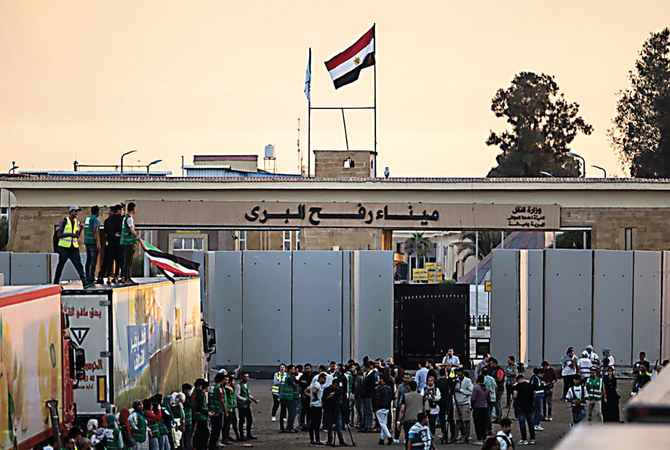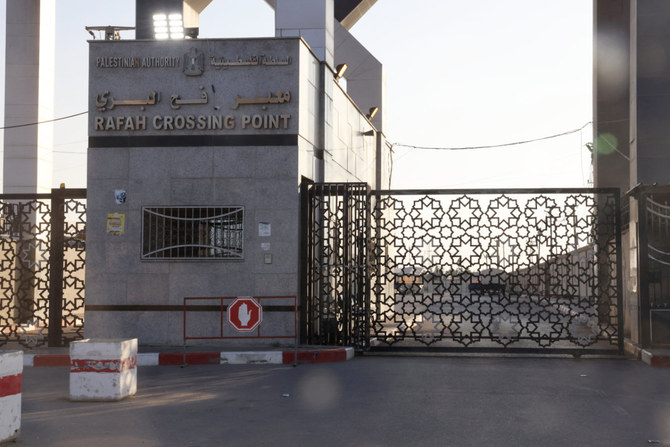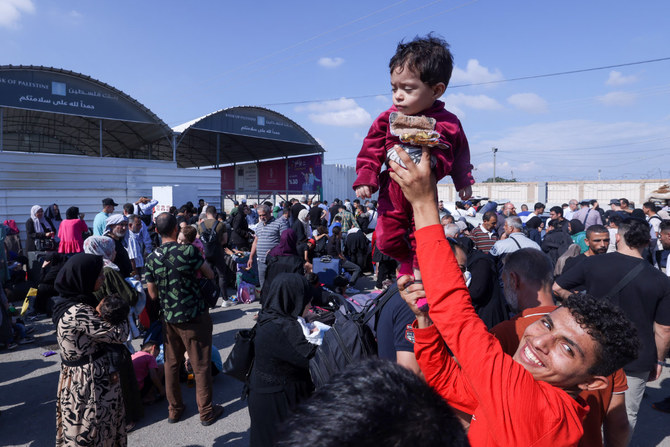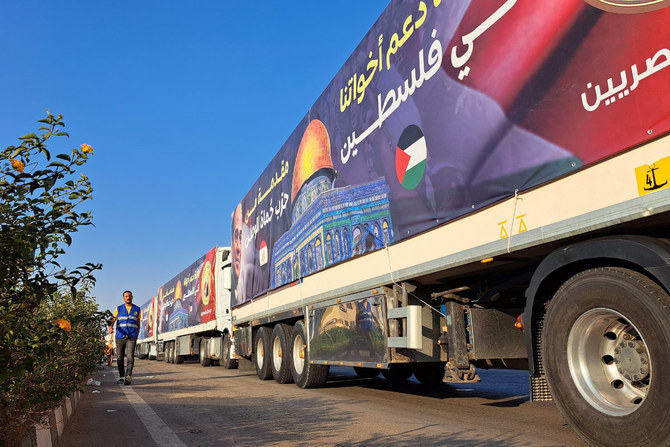RIYADH: As the humanitarian crisis in Gaza worsens in tandem with Israel’s expanding war with the Palestinian militant group Hamas, the Arab Gulf states have been pledging aid and support to assist civilians living under siege and daily bombardment.
Since Hamas launched its unprecedented cross-border attack on Israel on Oct. 7, Gaza has been under strict Israeli embargo, depriving its 2.2 million-strong population of food, water, medicine, and electricity.
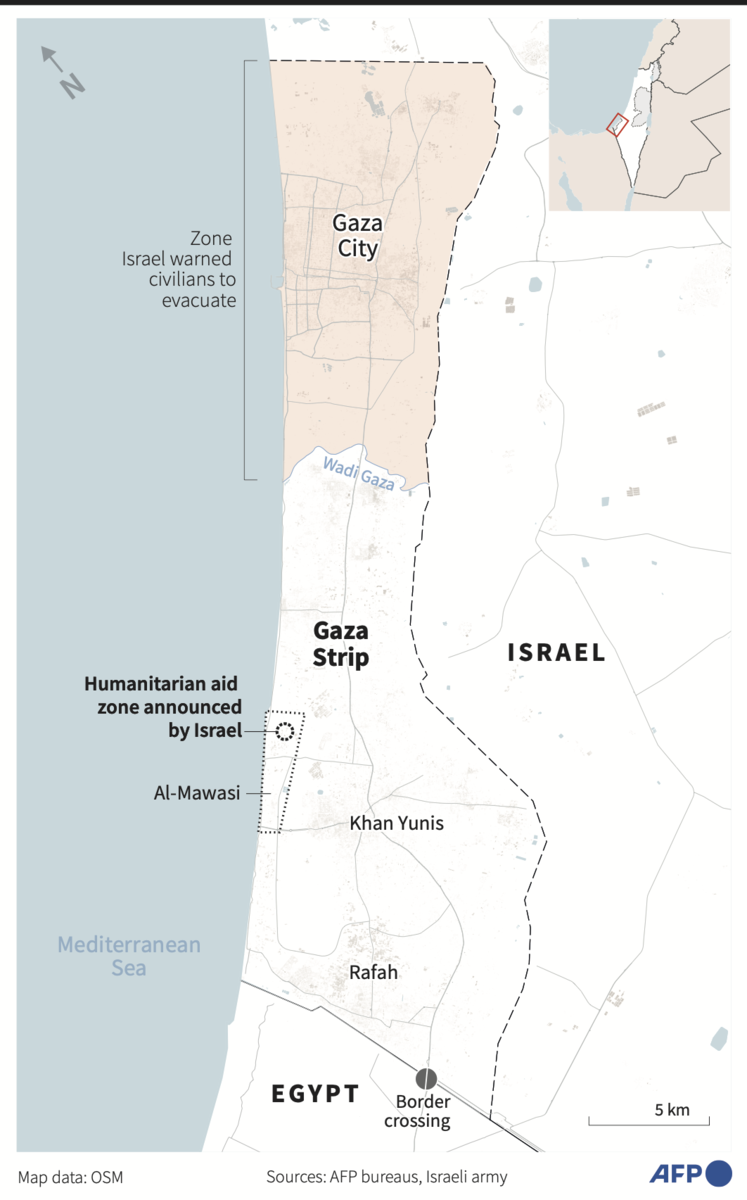
Gaza’s only power plant quickly shut down owing to a lack of fuel. According to the UN, hospitals in the Gaza Strip, where thousands of civilians have taken shelter, are expected to run out of generator fuel within days, putting the lives of patients at risk.
The siege, combined with the closure of the Rafah crossing between Gaza and Egypt, meant that humanitarian aid agencies found it impossible to deliver assistance. More than 200 trucks and some 3,000 tons of aid are reported to be positioned at or near the Rafah crossing, Gaza’s only connection to Egypt.
UNICEF, the UN children’s agency, has said that unless water and fuel are sent “immediately,” Gaza inhabitants are in “imminent danger” of epidemics and death.
On Wednesday, Israel said it would allow Egypt to deliver limited humanitarian aid to the Gaza Strip. The announcement to allow water, food, and other supplies came as anger over the blast at Gaza City’s Al-Ahli Hospital spread across the Middle East, and as US President Joe Biden visited Israel in hopes of preventing a wider conflict in the region.
Biden said Egyptian President Abdel Fattah El-Sisi agreed to open the crossing and to let in an initial group of 20 trucks with humanitarian aid. The convoy would start moving on Friday at the earliest, White House officials said.

Medics and a convoy of trucks loaded with aid supplies for Gaza provided by Egyptian NGOs waits for an agreement to cross through the Egypt-Gaza border in Arish City in Egypt’s north Sinai Peninsula on October 15, 2023. (AFP)
The office of the Israeli prime minister said Israel “will not thwart” deliveries of food, water, or medicine from Egypt, as long as they are limited to civilians in the south of Gaza and do not go to Hamas militants.
Supplies would go in under the supervision of the UN, Egyptian Foreign Minister Sameh Shoukry told Al-Arabiya TV.
The Egyptian side of the Rafah crossing has been bombed multiple times since Israel launched its war on Hamas. Egypt will have to repair the road across the border that was cratered by Israeli airstrikes.

Medics and a convoy of trucks loaded with aid supplies for Gaza provided by Egyptian NGOs waits for an agreement to cross through the Egypt-Gaza border in Arish City in Egypt’s north Sinai Peninsula on October 15, 2023. (AFP)
“At this stage, we can’t bring aid into Gaza,” Christoph Hangar, a spokesperson for the International Committee of the Red Cross in Geneva, told Arab News before the Israeli announcement was made.
“We are pre-positioning staff and relief items as we speak so we’re ready when access to Gaza is granted, which it must urgently be.”
In response to the deepening humanitarian emergency, Arab Gulf states have renewed their commitment to the resolution of the decades-old Israeli-Palestinian conflict and pledged millions of dollars in aid to the relief effort.

Volunteers and NGO workers stand near tents that they set up along the Egyptian side of the Rafah border crossing on October 19, 2023, demanding clearance for an aid convoy to enter the Gaza Strip. (AFP)
Israel has ordered residents of north Gaza to leave for the south, hoping perhaps to clear the area of civilians in preparation for a ground invasion, which would likely involve brutal urban combat.
The Oct. 7 attack killed at least 1,400 people, most of them Israeli civilians, and resulted in the capture of more than 200 people, who are now being held hostage in Gaza by Hamas and other “resistance factions.”
The presence of the hostages in the enclave has complicated Israel’s plans for a ground invasion.
INNUMBERS
2.4 million Population of the Gaza Strip.
1 million People displaced by the Israeli bombardment.
3,000 Palestinians killed across the Gaza Strip since Oct. 7.
$2 million Money donated to UNRWA by Saudi Arabia.
$6 billion Funding provided to Palestinians by KSrelief since 2000.
Antonio Guterres, the UN secretary-general, was due to meet El-Sisi in Egypt on Thursday to discuss how to get humanitarian aid into Gaza.
Stephane Dujarric, the spokesperson for the UN chief, said in a statement: “Obviously, in order to move humanitarian aid through Gaza, we need safe passage. We can’t move humanitarian trucks and convoys while active bombardment is ongoing.
“There are intense discussions going on in which we’re involved with a number of parties in order to try to get the most basic humanitarian aid in as quickly as possible and that’s food, water, medicine. Those things are urgently needed.”

Boxes of humanitarian aid and supplies from the Jordan Hashemite Charity Organization are loaded aboard cargo planes in Amman, Jordan, for Gaza on Oct. 12, 2023. (REUTERS)
“Since the creation of Israel, the Saudi population and government have always been very sympathetic to the Palestinian cause,” Khaled Al-Maeena, a Saudi political commentator, told Arab News.
“It was done out of genuine goodwill for the Palestinian people who were oppressed and whose lands were occupied. What we are witnessing now is a Palestinian holocaust.”
Since 2000, the Saudi aid agency KSrelief has provided more than $6 billion in aid to the Palestinian people across multiple sectors, including food security, health, education, water, sanitation, and shelter.
In 2022 alone, Saudi Arabia contributed $27 million to the UN Relief and Works Agency for Palestine Refugees. On Monday, Saudi Arabia announced it would be donating a further $2 million to UNRWA.

Saudi humanitarian aid group KSrelief has a continuing food basket distribution project in the West Bank and Gaza Strip. (KSrelief photo)
The money was presented to Philippe Lazzarini, the UNRWA commissioner general, by Naif Al-Sudairi, the Saudi ambassador to Jordan, at the Saudi Embassy in Amman on Sunday.
Saudi Arabia’s private sector has also been making pledges. McDonald’s KSA has publicly announced it will be donating $533,000 to Gaza relief efforts, stating it was “proud of its Saudi identity” and support for humanitarian issues.
“As a purely Saudi company, we have been proud, since our inception, of our Saudi identity, and our continuous contribution to supporting our economy and national community and adopting social and humanitarian matters that our community is concerned with,” the restaurant chain said in an online statement.
“We are delighted to announce that McDonald’s KSA will be donating SR2 million ($533,201) to support the relief efforts for the citizens of Gaza, may God help them. This contribution follows coordination with the relevant official authorities.”
Prior to the conflict, US-brokered talks had been underway concerning the potential normalization of relations between Saudi Arabia and Israel pending clear signs of progress on the status of the Palestinians.
In August, while these talks were ongoing, the Kingdom also offered to resume financial support for the Palestinian Authority.
How the present crisis will impact the normalization talks remains to be seen, but the Kingdom’s stance on the need to resolve the Palestinian question remains unchanged.
In a statement following the Hamas attack, the Saudi Foreign Ministry said it was “renewing its call on the international community to assume its responsibilities and activate a credible peace process that leads to a two-state solution in a way that achieves security and peace in the region and protects civilians.”
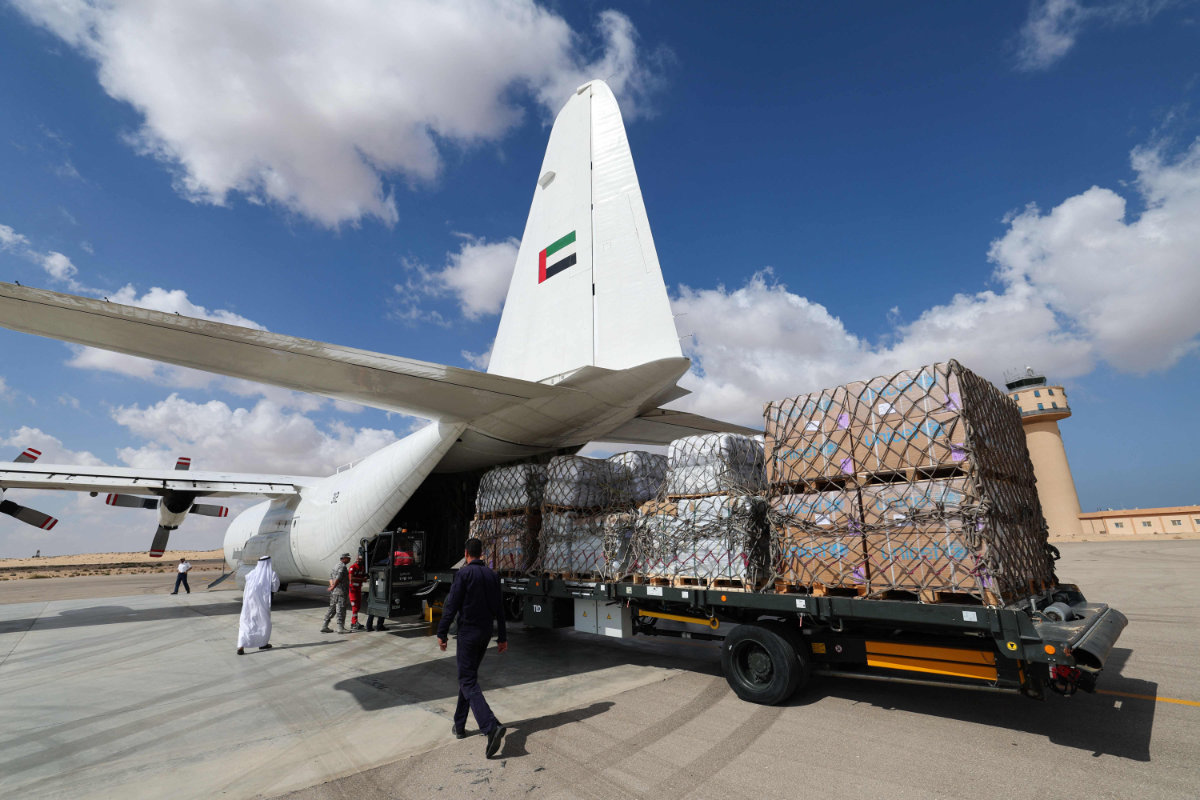
Staff members unload aid for the Palestinian Gaza Strip from an Emirates cargo plane on the tarmac of Egypt's el-Arish airport in the north Sinai Peninsula on October 19, 2023. (AFP)
In 2020, the UAE became the first Arab Gulf state to normalize relations with Israel under the US-brokered Abraham Accords.
A Comprehensive Economic Partnership Agreement between the two countries came into effect in March this year, signifying Israel’s first free trade agreement with an Arab state. Bahrain and Morocco followed suit.
In response to the crisis now unfolding in Gaza, the UAE has launched a campaign dubbed Tarahum — or “compassion” in Arabic — to help vulnerable civilians, particularly the 1 million children who make up nearly half of Gaza’s population.
Overseen by the Emirates Red Crescent, the UAE has called for donations and volunteers, with its first relief center established at the Abu Dhabi Cruise Terminal.

UAE's Sheikh Theyab bin Mohamed bin Zayed Al Nahyan, accompanied by other top officials, visits the Tarahum - for Gaza campaign center in Abu Dhabi, which opened on October 15. Other aid collection centers will also be opened across the UAE at later dates. (WAM photo)
A plane carrying medical supplies has already been sent to the Egyptian city of El-Arish before onward transit to the Rafah border crossing, according to the Emirati state news agency WAM.
On Tuesday, Mohammed bin Rashid Al-Maktoum, prime minister of the UAE, directed the provision of $20 million in humanitarian aid to the Palestinian people.
Qatar has likewise established its own aid effort, deploying a plane bound for El-Arish on Monday carrying 37 tons of food and medical aid, provided by the Qatar Fund for Development under the direction of Emir Sheikh Tamim bin Hamad Al-Thani.
“This aid is part of the State of Qatar’s full support for the fraternal Palestinian people amid the difficult humanitarian conditions due to the Israeli bombardment on the Gaza Strip,” Qatar’s Foreign Ministry said in a statement.

Qatari Air Force crew load food and medical aid to a cargo plane on October 16, 2023, at Al Udeid Air Base in Doha. The humanitarian aid from the Qatar Fund for Development is headed to Egypt for Gaza refugees. (Qatar News Agency/Handout via REUTERS)
Palestinians have been massing at the sealed Rafah border crossing since the crisis began, in the hope of leaving Gaza before the much talked about ground offensive begins. On the other side of the border fence, aid agencies are powerless to intervene.
“We are exploring all avenues to bring life-saving aid into Gaza,” said Hangar of the ICRC. “This initial goods convoy includes medicine and thousands of household kits for families which include hygiene items and chlorine tablets for drinking water.”
He added: “We are also urgently deploying staff to relieve colleagues in Gaza whenever we are able to move in. This includes a mobile surgical team and other health staff, a weapons contamination expert, and relief coordinators specialized in water and habitat and food security.”



